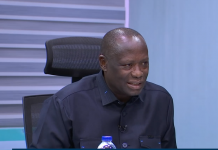George Quaye, the President of the Arts and Tourism Writers Association, has voiced concerns about the struggles facing Ghana’s arts and tourism sector, blaming its stagnation on the absence of a strategic vision from those overseeing the industry.
During an appearance on the Citi Breakfast Show on Tuesday, December 24, Quaye called for a more intentional and forward-thinking approach to reviving the sector.
He also criticized political parties for neglecting arts and tourism in their manifestos, focusing instead on sectors like agriculture, education, and the economy.

Quaye emphasized that inadequate infrastructure and poor communication have become significant obstacles to growth. He argued that these challenges arise from a failure to acknowledge the importance of the arts and tourism industry in the country’s broader development agenda.
Quaye urged political parties to include robust policies for arts and tourism development in their manifestos, emphasizing the need for investments in infrastructure, marketing, and capacity building to unlock the sector’s full potential.
His comments come amid growing calls from stakeholders for a comprehensive strategy to harness Ghana’s rich cultural and natural resources, transforming the sector into a cornerstone of the nation’s economy.
“When you are driving to Cape Coast or even Takoradi, you do not see any billboard telling you how far the Cape Coast Castle is, and it is the same with almost all of our tourist sites, and that is a problem of vision, and somebody needs to think it, see it, dream it, and implement it, and some of us have spoken about it.
“But in Ghana, it looks like if you are not the one making the decisions, no one gets to hear you. When you look at the political parties manifestoes, it looks like a lot of work has not gone into the art and the creative industry as compared with other sectors and all that sits on the vision I am talking about because if we have people of vision, you won’t have political parties tell you they are going to create TV stations and online platforms when there are low hanging fruits.”























































![[FREE FREE MONEY] Predict and Win a Guaranteed GH¢200 From Us EVERY WEEK](https://wordpress.ghanatalksradio.com/wp-content/uploads/2022/02/Predict-and-Win-Final-09-03-2021-218x150.jpg)
![[Predict & Win – 8th/Oct.] WIN A Guaranteed ¢200 From Us This Week](https://wordpress.ghanatalksradio.com/wp-content/uploads/2021/10/maxresdefault-16-218x150.jpg)
![[Predict & Win – 2nd] WIN A Guaranteed ¢200 From Us This Week](https://wordpress.ghanatalksradio.com/wp-content/uploads/2021/09/maxresdefault-50-218x150.jpg)
![[Predict & Win – 25th] WIN A Guaranteed ¢200 From Us This Week](https://wordpress.ghanatalksradio.com/wp-content/uploads/2021/09/maxresdefault-36-218x150.jpg)
![[Predict & Win – 18th] WIN A Guaranteed ¢200 From Us This Week](https://wordpress.ghanatalksradio.com/wp-content/uploads/2021/09/maxresdefault-23-218x150.jpg)








![[National cathedral] See full list of churches that have contributed since 2018](https://wordpress.ghanatalksradio.com/wp-content/uploads/2020/09/Ghana-National-Cathedral-GhanaTalksRadio-100x70.jpg)



